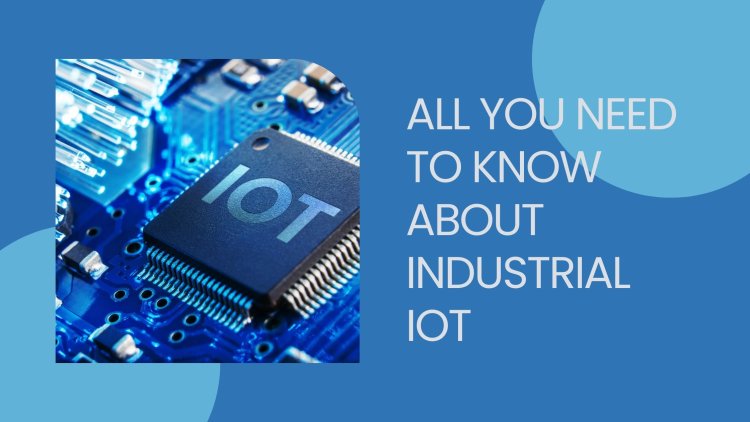All You Need to Know About Industrial IoT
Discover the essentials of Industrial IoT (IIoT) in our comprehensive guide. Learn about its benefits, applications, future trends, and how wireless modules enhance industrial operations.
Share this Post to earn Money ( Upto ₹100 per 1000 Views )

What is Industrial IoT?
The Industrial Internet of Things (IIoT) refers to the integration of internet-connected electronic components like sensors, devices, and machinery in industrial settings. These connected devices collect, share, and analyze data to improve efficiency, productivity, and safety in industrial operations.
The Industrial IoT is revolutionizing the way industries operate by connecting machines, devices, and systems in a network that collects and exchanges data. This connectivity allows for better monitoring, analysis, and decision-making, leading to improved efficiency, productivity, and safety in industrial environments.
Benefits of Industrial IoT
Increased Efficiency:
IIoT enables real-time monitoring of equipment and processes, which helps identify inefficiencies and optimize operations. Automated systems can adjust processes on-the-fly, reducing waste and downtime.
Predictive Maintenance:
With Industrial IoT, sensors with the help of Wireless modules like SIMCOM 800 on equipment can detect potential issues before they lead to failures. This predictive maintenance minimizes unexpected downtime and extends the lifespan of machinery.
Enhanced Safety:
IIoT enhances workplace safety by monitoring environmental conditions and machinery. If dangerous conditions are detected, the system can alert workers or even shut down equipment automatically.
Cost Savings:
By improving efficiency, reducing downtime, and preventing accidents, IIoT helps companies save money. Additionally, better asset management and energy efficiency contribute to cost reductions.
Data-Driven Decision Making:
IIoT provides a wealth of data that can be analyzed to make informed decisions. This data-driven approach helps companies optimize operations, improve product quality, and innovate more effectively.
Applications of Industrial IoT
Manufacturing:
IIoT is widely used in manufacturing to monitor and control production processes, ensuring high quality and efficiency. Smart factories utilize IIoT for automation, predictive maintenance, and inventory management.
Energy:
In the energy sector, IIoT helps monitor and manage the generation, distribution, and consumption of energy. It enhances grid reliability, optimizes energy usage, and integrates renewable energy sources more effectively.
Transportation:
IIoT is applied in transportation for fleet management, tracking vehicle performance, and improving logistics. It enhances route planning, reduces fuel consumption, and increases safety.
Healthcare:
IIoT devices in healthcare monitor equipment and patient conditions in real-time. This ensures better maintenance of medical devices and improves patient care through continuous monitoring.
Agriculture:
Smart farming uses IIoT to monitor soil conditions, weather, and crop health. This data helps farmers optimize irrigation, fertilization, and pest control, leading to higher yields and sustainable practices.
Future of Industrial IoT
The future of the Industrial Internet of Things (IIoT) looks promising as advancements in technology continue to drive its adoption. Key trends to watch include the rollout of 5G networks, which will provide faster and more reliable connections for IIoT devices, enabling more sophisticated applications and real-time data processing.
Additionally, artificial intelligence (AI) and machine learning will further enhance IIoT by offering advanced analytics and automation capabilities, thus allowing for smarter decision-making and predictive maintenance.
Another significant trend is edge computing, where processing data closer to its generation point (at the "edge" of the network) will reduce latency and improve efficiency, crucial for real-time applications and managing large volumes of data.
As IIoT adoption grows, cybersecurity will become increasingly important, with advancements in security protocols and practices aimed at protecting industrial systems from cyber threats.
Furthermore, there will be increased efforts towards standardizing IIoT protocols and ensuring interoperability between different systems and devices, facilitating easier integration and scalability of IIoT solutions.
Final Thoughts
With the implementation of IoT industrial operations becomes smarter, more efficient, and safer. Its benefits, from predictive maintenance to enhanced data-driven decision-making, are driving widespread adoption of IoT across various sectors.
As technology continues to advance, the future of Industrial IoT promises even greater improvements in connectivity, automation, and security. Embracing industrial IoT is not just a competitive advantage but a necessary step for industries aiming to thrive in the modern era.

 campuscomponent
campuscomponent 





